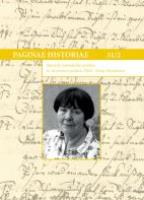Fiktivní memoria ve službách politiky
Fictitious Memoria in the Service of Politics
Author(s): Marie BláhováSubject(s): History, 13th to 14th Centuries, 15th Century
Published by: Národní archiv
Keywords: rulers; historical memory; propaganda; legitimacy; medieval chronicles
Summary/Abstract: The author inquires into the memoria phenomenon and its distortion and use in Charles IV’s propaganda, especially in official historiography. As King of the Romans and King of Bohemia, and crowned as Holy Roman Emperor on Easter Sunday, 7 April 1355, Charles IV was aware of the price of ‘historical memory’ for politics and law and he knew how to use it. To legitimate his status in the empire and Bohemia, he primarily used the genealogical ‘memory’, expanded by many fictions and stretching back to the dawn of humans. Furthermore, he used fictitious historical memory to substantiate the status of Bohemia and its sovereign within the Holy Roman Empire, the ruler’s royal title, the elector’s office, and the Prague Archdiocese. Yet, Charles IV put special emphasis on the territorial scope of Bohemia and confirmation of its legitimacy, as well as the possibilities for its further expansion, justifying it by the long tradition and historical ‘memory’. They primarily appeared in the Chronicle of Bohemia by Přibík Pulkava of Radenín who in the spirit of Charles IV showed that all the countries that were part of the Bohemian Crown under Charles IV – including Bohemia, Moravia, Lusatia, most of the duchies in Silesia, and Brandenburg – were settled by Slavs of forefather Čech’s descent, and the Bohemian ruler is fully eligible to rule in these lands. Yet, the Slavs, descendants of forefather Čech, also cultivated and settled other lands – Poland, Russia, Pomerania, and Cassubia – all the way to the Baltic Sea. This concept corresponded with Charles’s political intentions when, by marriage to Elisabeth, daughter of Duke of Pomerania Bogislaw and granddaughter of King Casimir III of Poland, he expanded his political and business interests up to the Baltic coast. But above all, through this historical ‘memory’, he legitimated his claims to Poland, as King Casimir III had no male descendants, and Sigismund, the son of Elisabeth of Pomerania and Charles IV, could be a prime candidate for the Polish throne. Hence, by including Poland and the neighbouring lands in the Bohemian historical memoria, the official propaganda of Charles IV’s court also legitimated Charles’s ambitions to acquire Poland and possibly other territories. The fictitious memoria was thus one of the main tools to justify the territorial interests of Charles IV.
Journal: Paginae Historiae
- Issue Year: 31/2023
- Issue No: 2
- Page Range: 29-40
- Page Count: 11
- Language: Czech

